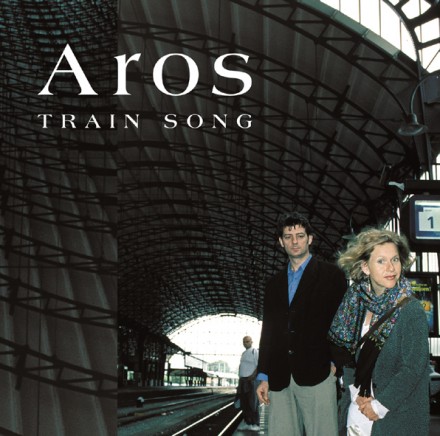Aros
Train Song
SGL SA1546-2“[Aros] has at its fingertips an array of compositions that effortlessly span eras and genres, sounding at times like early jazz, modern jazz, impressionist salon music, and late-20th-century minimalism, occasionally all at once. Prismatic in approach and global in scope, with references that extend to progressive rock, West African drumming, and Indonesian gamelan, the tunes Armus and von Tilzer have written for their band are unique in contemporary music, and very beautiful as well.”
—Alexander Varty, The Georgia Straight
Amsterdam-based Aros is an international sextet co-led by Canadian saxophonist Rob Armus and Austrian classical pianist music Marion von Tilzer. Its other members are Vancouver jazz/new music trumpeter and bandleader John Korsrud, Pakistani/Scottish classical/jazz/rock violinist Anne Wood, Scottish jazz/improv/rock/reggae percussionist Alan Purves, and German bassist Sven Schuster. Aros synthesizes many influences into their own blend of chamber jazz and contemporary new music, including American jazz, European classical and new music, and tango. There are echoes of Bach, Coltrane, 19th century romanticism, African polyrhythms, ragas, and more. Imagine for example Astor Piazzolla and Philip Glass combining forces to create modal jazz with an occasional nod to free improv. In fact there’s quite a range of moods and styles, from heartfelt lyrical intimacy to driving soul jazz vamps. Recorded and mixed entirely in DSD, this vibrant recording is Aros’ first North American release (their first CD was issued by BVHaast in 2001). By no means difficult or avant-garde, it should appeal to a broad range of tastes.
The band came together in Amsterdam in the late 1990s. Armus explains:
“The relationship with Marion was about learning from each other: she showed me things about contemporary music and I showed her jazz, and now Marion is an improviser and I’m more educated towards contemporary music. I felt after years of playing free improvised music that Iʼd come to some type of dead-end and was needing more form. Marion on the other hand had been playing very structured classical music her whole life and was seeking more freedom, so we tried to combine form and structure with improvisation. Rather than having one long solo, everybody may have little sections where they improvise on a strict chord sequence within the rhythmic structure, as if the improvisation is a continuation of their part. I’d been interested for many years in Ghanaian music, particularly a ceremonial rhythm called abadja. I found that if I mixed a rhythm in 6 with another rhythm in 5 to make a cycle of 30 (for example in the piece “30”) it made for an interesting base for improvising, and many possibilities for composition. I later realized that Steve Reich was using such techniques from listening to African music also.”
Von Tilzer takes up the thread:
“I feel that in this time when through the mobility of society and the media we are exposed to so many cultures it is very important to connect with different cultures and be inspired by them. Learning about jazz has been a wonderful adventure and has made me reconnect with music in a whole new way, to recognize the similarities and the differences of the different styles – but in the end it is all music. The instrumentation of Aros is like a mini-orchestra, with a horn section, a string section, and piano (which often has the function of a ‘harmonic carpet’) and percussion. My harmonic and melodic inspiration comes a lot from my beloved composers Bela Bartok, Olivier Messiaen and Arvo Part. My pieces usually have a life of their own once I start writing them, unfolding their story. For instance “Song of the Heart” started with the piano part in 11/8 which was inviting a dreamlike melody from the violin in 12/8, a Chopinesque way of using polyrhythms – where unlike in African music it does not create a groove but makes the melody float above the repetitive accompaniment, since the accents of the melody in the violin do not coincide with the ones of the piano part.”
“…tonal, swinging, inventive New jazz…shouldn’t be missed.” — Cadence
**** “…Aros’s music is refined, sharp…the melodies and timbres come across with great delicacy.” — Jazzman (France)
